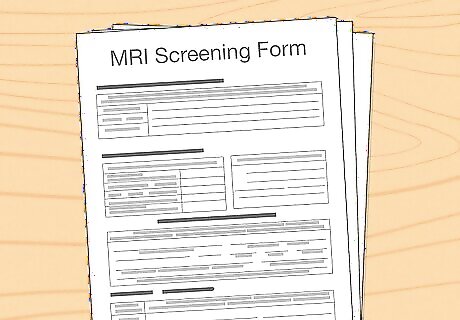
views
X
Research source
An MRI can help your physician make a diagnosis and recommend the best treatment options for your condition. You do not have to do much to prepare for your magnetic resonance imaging (MRI) exam, but knowing what to expect can help you feel prepared for the test.
Preparing Before the Exam

Inform your physician if you are claustrophobic. During an MRI, you will be enclosed in a tube-like machine for up to an hour. If you are claustrophobic, this experience can cause a great deal of anxiety, and you may need a sedative before the test if you are anxious. Talk to your doctor about your claustrophobia before the exam to see if he or she may be able to prescribe you a sedative for the procedure.

Tell doctors about any metal implants you have. Certain metallic implants may effect the MRI scans. Talk to your doctor about any metal implants you have prior to the exam. Cochlear (ear) implants, clips used for brain aneurysms, metal coils placed within blood vessels, any kind of cardiac defibrillator or pacemaker generally means you cannot be placed in an MRI machine. Some metallic implants pose a some risk to health and safety and the accuracy of the exam. However, depending on how long the devices have been in place before the exam it might be safe to undergo the exam with some of the following in place: artificial heart valves, implanted drug infusion ports, artificial limbs or metallic joint prosthetics, implanted nerve simulators, metal pins, screws, plates, stents, and surgical staples.

Alert your doctor to any health issues. Certain health concerns should be taken into consideration before you have an MRI. Talk to your doctor about safety if you have any of the following conditions: Pregnancy History of kidney problems Allergy to iodine or gadolinium History of diabetes

Take medications as normal. Before your MRI, you should take your medication as normal leading up to the exam unless otherwise instructed. You should strive to maintain as normal a schedule as possible leading up to the MRI exam.

Learn what to expect. Reading up on what happens during an MRI exam can help ease the anxiety of the procedure. Learn what to expect in the days leading up to the exam. An MRI is a large tube with holes on either end. You'll be placed on a moveable table that slides into the tube while a technologist monitors you from another room. Magnetic fields and radio waves provide an internal reading of your body, used to detect things like brain tumors or brain cancer, chronic conditions, and other abnormalities. The procedure, however, is painless as you do not feel the magnetic fields. The MRI machine makes a lot of noise while the procedure is taking place. Many patients opt to bring earplugs and listen to music or books on tape during the process. Exams vary in length, but some can be quite long. It occasionally takes up to an hour for an exam to be completed.

Follow any specific guidelines your doctor went over with you. In most cases, you'll continue on your regular schedule without making any changes. However, if you have specific medical concerns your doctor may recommend altering medications, diet, or sleeping habits leading up to the exam. Follow any guidelines your doctor reviewed with you and call and ask if you have any questions.
Arriving to the Exam

Consider asking a friend or family member to join you. If you're going to be sedated due to claustrophobia, you'll need someone to drive you to and from the hospital or make sure you get home safe via public transportation or a taxi. Even if you will be fully conscious for the procedure, it's a good idea to have a friend or family member come with you. The procedure is lengthy and can be quite stressful.

Arrive early. You should arrive to the exam 30 minutes early. There will be paperwork you'll need to fill out and a doctor or nurse may want to talk to you about the procedure beforehand.

Remove any items that may contain metal. Before your MRI exam, you need to remove the following items as they may contain metal: All jewelry Eyeglasses Hairpins/Barrettes containing metal Dentures Watches Hearing aids Wigs Underwire bras

Fill out an MRI screening form. Before you undergo the exam, you'll be asked to fill out an MRI screening form. This is a 3 to 5 page document that asks for basic information about your name, age, birth date, as well as questions about your medical history. Take time to read the form closely and answer all questions to the best of your ability. Ask the doctor or nurse if you have any questions regarding the paperwork. This form will also ask questions about allergies and any past reactions you have had to contrast materials used in imaging procedures. Some MRIs require an intravenous injection of a contrast material called gadolinium, which can cause an allergic reaction in rare instances.

Follow the instructions you are given during the MRI. Once you've filled out the paperwork, you'll enter the MRI room. The doctor will have you change into a hospital gown. From there, follow the doctor's instructions regarding the test. During the MRI, you will be able to hear and speak with your doctor or MRI technician. In some cases, you may be asked to perform some simple tasks, such as tapping your fingers or answering some easy questions. Stay as still as possible during the procedure. You will be instructed to stay still to ensure that the images will be clear. Just try to breathe normally and stay still.

















Comments
0 comment